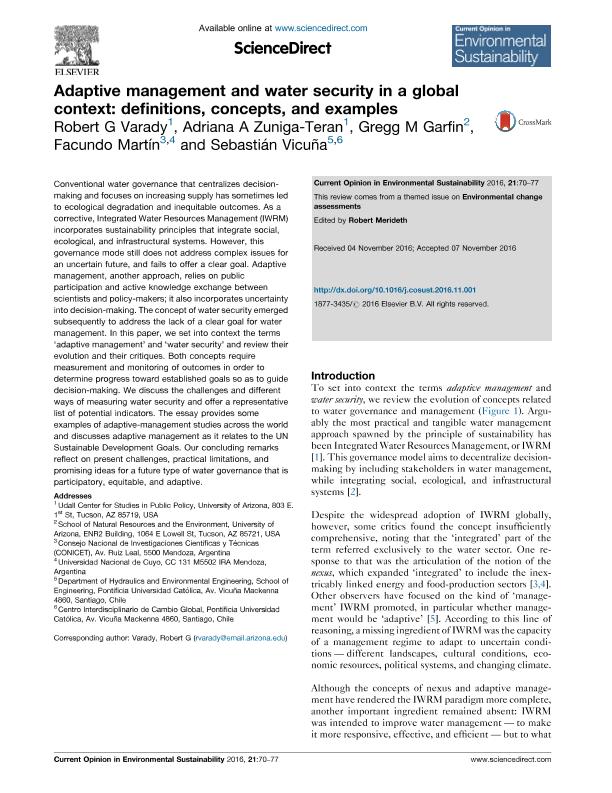Mostrar el registro sencillo del ítem
dc.contributor.author
Varady, Robert G.
dc.contributor.author
Zuniga-Teran, Adriana A.
dc.contributor.author
Garfin, Gregg M.
dc.contributor.author
Martin, Facundo Damian

dc.contributor.author
Vicuña, Sebastián
dc.date.available
2018-04-26T13:14:32Z
dc.date.issued
2016-08
dc.identifier.citation
Varady, Robert G.; Zuniga-Teran, Adriana A.; Garfin, Gregg M.; Martin, Facundo Damian; Vicuña, Sebastián; Adaptive management and water security in a global context: definitions, concepts, and examples; Elsevier; Current Opinion in Environmental Sustainability; 21; 8-2016; 70-77
dc.identifier.issn
1877-3435
dc.identifier.uri
http://hdl.handle.net/11336/43512
dc.description.abstract
Conventional water governance that centralizes decision-making and focuses on increasing supply has sometimes led to ecological degradation and inequitable outcomes. As a corrective, Integrated Water Resources Management (IWRM) incorporates sustainability principles that integrate social, ecological, and infrastructural systems. However, this governance mode still does not address complex issues for an uncertain future, and fails to offer a clear goal. Adaptive management, another approach, relies on public participation and active knowledge exchange between scientists and policy-makers; it also incorporates uncertainty into decision-making. The concept of water security emerged subsequently to address the lack of a clear goal for water management. In this paper, we set into context the terms ?adaptive management? and ?water security? and review their evolution and their critiques. Both concepts require measurement and monitoring of outcomes in order to determine progress toward established goals so as to guide decision-making. We discuss the challenges and different ways of measuring water security and offer a representative list of potential indicators. The essay provides some examples of adaptive-management studies across the world and discusses adaptive management as it relates to the UN Sustainable Development Goals. Our concluding remarks reflect on present challenges, practical limitations, and promising ideas for a future type of water governance that is participatory, equitable, and adaptive.
dc.format
application/pdf
dc.language.iso
eng
dc.publisher
Elsevier

dc.rights
info:eu-repo/semantics/openAccess
dc.rights.uri
https://creativecommons.org/licenses/by-nc-nd/2.5/ar/
dc.subject
Water Security
dc.subject
Adaptive Management
dc.subject
Global Context
dc.subject.classification
Otras Ciencias Sociales

dc.subject.classification
Otras Ciencias Sociales

dc.subject.classification
CIENCIAS SOCIALES

dc.title
Adaptive management and water security in a global context: definitions, concepts, and examples
dc.type
info:eu-repo/semantics/article
dc.type
info:ar-repo/semantics/artículo
dc.type
info:eu-repo/semantics/publishedVersion
dc.date.updated
2018-04-24T17:14:56Z
dc.journal.volume
21
dc.journal.pagination
70-77
dc.journal.pais
Estados Unidos

dc.description.fil
Fil: Varady, Robert G.. University of Arizona; Estados Unidos
dc.description.fil
Fil: Zuniga-Teran, Adriana A.. University of Arizona; Estados Unidos
dc.description.fil
Fil: Garfin, Gregg M.. University of Arizona; Estados Unidos
dc.description.fil
Fil: Martin, Facundo Damian. Universidad Nacional de Cuyo; Argentina. Consejo Nacional de Investigaciones Científicas y Técnicas. Centro Científico Tecnológico Conicet - Mendoza. Instituto de Ciencias Humanas, Sociales y Ambientales; Argentina
dc.description.fil
Fil: Vicuña, Sebastián. Pontificia Universidad Católica de Chile; Chile. Universidad Católica de Chile; Chile
dc.journal.title
Current Opinion in Environmental Sustainability
dc.relation.alternativeid
info:eu-repo/semantics/altIdentifier/doi/https://doi.org/10.1016/j.cosust.2016.11.001
dc.relation.alternativeid
info:eu-repo/semantics/altIdentifier/url/https://www.sciencedirect.com/science/article/pii/S1877343516300719
Archivos asociados
